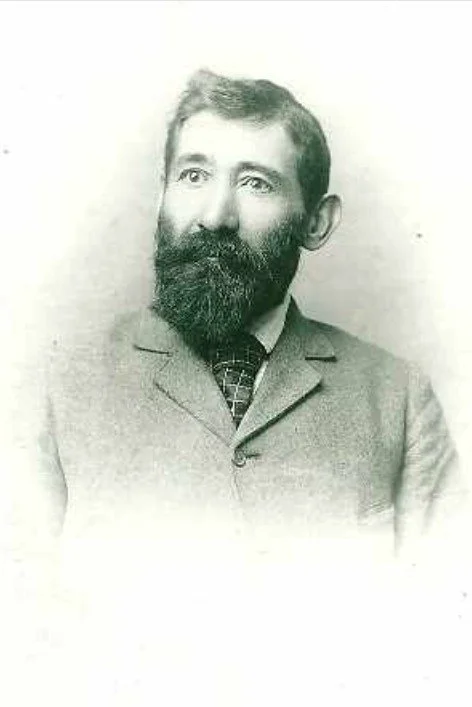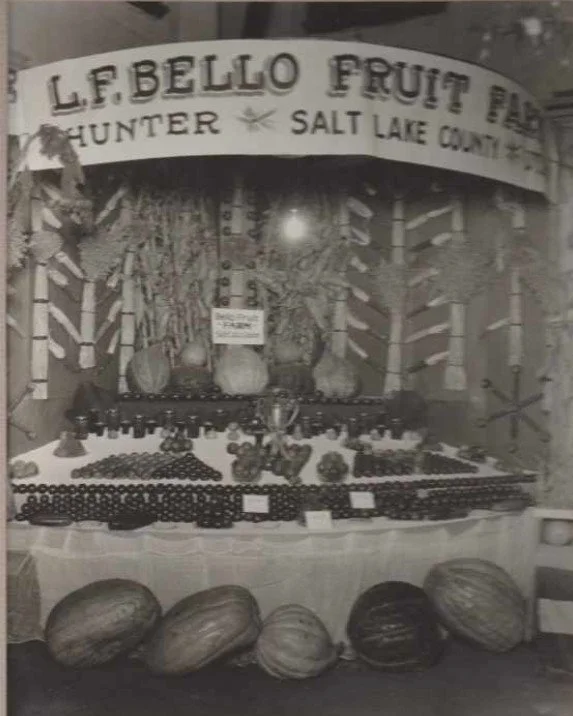Hunter’s Gentleman Farmer: The Legacy of Luis Ferrer Bello
Early Years in Nevada
Before settling in Hunter, Utah, Luis Ferrer Bello was born in 1853 in Baja Mexico. Loius carved out a remarkable life in Nevada’s North Fork of the Humboldt River Valley. About the time he married in 1888, he filed a homestead claim on 160 acres near “Devil’s Gate,” wisely choosing a protected bench of land that was spared from the floods that later devastated the valley.
With little more than the materials at hand, Bello built a sturdy lime-mud home with willow rafters, a warm stove, and later glass windows. He constructed a dam and irrigation ditch, even building a water wheel to lift water up to his garden—an ingenious effort that turned harsh land into fertile ground. To extend the short growing season, he created hot-beds, shallow pits filled with fresh manure and covered with soil and glass. This natural heating system allowed him to raise pumpkins, melons, and other crops that normally could not survive at the high elevation.
The Bello home soon became a hub for neighbors. A post office was established there, with Luis serving as postmaster of Beaver, Nevada. He also sat on the school board, and the first school classes were held in his bunkhouse. Education, he believed, was the key to improving life in the valley.
By 1906, overgrazing by sheep and a shrinking water supply made it impossible to stay. Seeking better opportunities for his children, Bello sold the ranch and moved to Hunter, Utah—carrying forward the same determination, faith, and generosity that had defined his Nevada years.
Life in Hunter, Utah
By the spring of 1906, Luis (1853–1932) and his wife Louisa Stevens Bello (1870–1931) began to see changes in their Nevada homestead. Water in the river grew scarce, sheep herds overtook grazing lands, and they realized their children would need better educational opportunities. With heavy hearts, they sold their ranch and moved on.
That same year, Luis purchased 160 acres in Hunter, Utah, along with 130 shares in the Utah & Salt Lake Canal Company, for $7,450. It was a significant investment that marked a new chapter for the family. In Hunter, Bello turned his energy toward building one of the area’s best-known fruit farms. His orchards produced an abundance of apples, peaches, cherries, and vegetables, and he became known for his generosity. He often loaded his wagon with fresh produce and drove it into Salt Lake City—always stopping first at the Governor’s residence to share the bounty before selling to local markets.
Neighbors recalled him as a hardworking, kind, and gentlemanly figure, always willing to lend a hand. His fruit farm not only provided for his large family, but also supplied much-needed produce to the growing Salt Lake Valley. The Bello orchards were a source of pride in Hunter, and his success encouraged other settlers to experiment with fruit farming in the area.
Luis never lost his commitment to education and civic service. He remained active in politics, the LDS Church, and community projects, believing that improving the land and the lives of others was the truest legacy he could leave.
In 1919, Bello suffered a fall on icy pavement that broke his hip, which led to pneumonia and, ultimately, his death at age 77. His funeral was widely attended, reflecting the deep respect friends, neighbors, and community leaders felt for him.
From his early days as a homesteader in Nevada, building a home of lime mud and willow rafters, to his years as a beloved fruit farmer in Hunter, Utah, Luis Ferrer Bello’s life was a story of perseverance, generosity, and faith in community.






